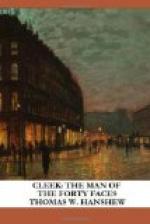“Thank you,” he said in a choked voice. “You’ve given me my chance; now watch me live up to it. The Vanishing Cracksman has vanished forever, Mr. Narkom, and it’s Cleek, the detective—Cleek of the Forty Faces from this time on. Now, give me your riddles—I’ll solve them one by one.”
CHAPTER I
The sound came again—so unmistakably, this time, the sound of a footstep in the soft, squashy ooze on the Heath, there could be no question regarding the nature of it. Miss Lorne came to an instant standstill and clutched her belongings closer to her with a shake and a quiver; and a swift prickle of goose-flesh ran round her shoulders and up and down the backs of her hands. There was good, brave blood in her, it is true; but good, brave blood isn’t much to fall back upon if you happen to be a girl without escort, carrying a hand-bag containing twenty-odd pounds in money, several bits of valuable jewellery—your whole earthly possessions, in fact—and have lost your way on Hampstead Heath at half-past eight o’clock at night, with a spring fog shutting you in like a wall and shutting out everything else but a “mackerel” collection of clouds that looked like grey smudges on the greasy-silver of a twilit sky.
She looked round, but she could see nothing and nobody. The Heath was a white waste that might have been part of the scenery in Lapland for all there was to tell that it lay within reach of the heart and pulse of the sluggish leviathan London. Over it the vapours of night crowded, an almost palpable wall of thick, wet mist, stirred now and again by some atmospheric movement which could scarcely be called a wind, although, at times, it drew long, lacey filaments above the level of the denser mass of fog and melted away with them into the calm, still upper air.
Miss Lorne hesitated between two very natural impulses—to gather up her skirts and run, or to stand her ground and demand an explanation from the person who was undoubtedly following her. She chose the latter.
“Who is there? Why are you following me? What do you want?” she flung out, keeping her voice as steady as the hard, sharp hammering of her heart would permit.
The question was answered at once—rather startlingly, since the footsteps which caused her alarm, had all the while proceeded from behind, and slightly to the left of her. Now there came a hurried rush and scramble on the right; there was the sound of a match being scratched, a blob of light in the grey of the mist, and she saw standing in front of her, a ragged, weedy, red-headed youth, with the blazing match in his scooped hands.
He was thin to the point of ghastliness. Hunger was in his pinched face, his high cheekbones, his gouged jaws; staring like a starved wolf, through the unnatural brightness of his pale eyes, from every gaunt feature of him.
“’Ullo!” he said with a strong Cockney accent, as he came up out of the fog, and the flare of the match gave him a full view of her, standing there with her lips shut hard, and, the hand-bag dutched up close to her with both hands. “You wot called, was it? Wot price me for arnswerin’ of you, eh?”




